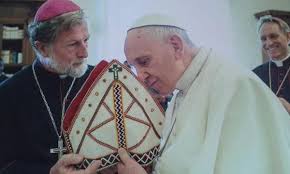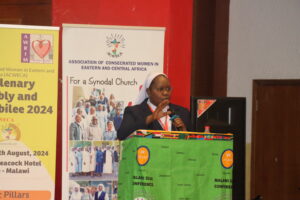KENYA: Diocese of Maralal working towards Reconciliation Hope to Warring Communities of Samburu County

Online News had an exclusive interview with the Caritas Director from the
Diocese of Maralal and last week publish part one of the series on the
realities of Samburu County and the Catholic Church’s effort in conjunction
with partners to bring peace and reconciliation as well as provide for
humanitarian basic needs to the communities of Samburu County.
effort in conjunction with partners towards bringing and Reconciliation in
Samburu County
 Although the
Although theinter-ethnic conflict over cattle rustling in the county of Samburu has continued
to pose a security threat on the local people and underdevelopment, the
Catholic Diocese of Maralal, which covers the entire County, is working round
the clock in bid to bring peace, and reconciliation among the conflicting
communities. With the help of donor partners, a number of initiatives have been
started by the diocese and so far, the fruits have begun to manifest albeit
slowly.
rustling have been seen just like a lifestyle among the pastoralist communities
of the Northern Kenya. It is not even defined in the Law of Kenya, yet in the
real sense it is robbery with violence but unfortunately not under that
category. It is just seen as a normal thing. And as the situation is left
uncontrolled, we in Samburu County continue closing schools, there are places
where people have just deserted and left completely because of the conflict and
we continue losing live and there is a lot of division,” said Mr. Evans
Onyiego, Caritas Director, Diocese of Samburu.
diocese we are working through interfaith structure and part of our observation
is that the conscience of people is dead and we believe that faith has space
for reconciliation,” Onyiego said adding that the logo of the Bishop of Maralal
is with the ministry of reconciliation where there is the lion and the lamb staying
together. With this vision we go to the community and try to bring together the
different denominations first to pray for peace because we believe that peace
will eventually come from God.”
Onyiego praying alone is not enough; the biggest mission is to get the gun out
of the people’s mind. “The gun that the people of Samburu have is
psychological. You might convince them at one point to surrender it but still the
people would still go and acquire another one because they feels that they are
not safe without that gun. So first we have to remove the gun from their
mindset.”
The diocese with
the help of various partners, is trying to bring in connector projects to help
bring the communities together. “We have managed to set up a school for peace
where we have the children of Pokot, Turkana and Samburu studying together. Our
motive is to remove the perception that has been created in the minds of these
young children by their parents that people from certain communities are bad
and must be treated as enemies. Our aim is to integrate these children by
having them stay together, share and appreciate each the culture of each other.
So far this is working very well. We have also done water projects through
which we are encouraging the communities to share the resources by making it
clear that the resource belongs to all; Turkana, Pokot and Samburu and they
have to use it together so that all have to benefit,” Onyiego explained.
is also working very closely with the government in terms of advocacy. “We did
a mapping, of various resources in the county to establish which community
resources are available in terms of roads, health facilities, schools, and out
of this mapping we are able to advocate and lobby the government to provide the
necessary social amenities and infrastructure,” he said adding that once the
government responds, it opens up for various interactions to take place.
effort by the diocese to improve the situation is by spearheading alternative
sources of livelihood to the pastoral communities especially the young people.
“We have started income generating projects whereby we are giving young people
money to venture into farming and other income projects such as chicken rearing
chicken and this are all in a bid to change their mindset that livelihood is
not dependent only in the cow.
projects, Mr. Onyiego says that The Catholic Agency for Overseas Development
(CAFOD) has always remained their faithful partner since the inception of the
diocese. “We started working with them on integrated approach because the kind
of problems we are dealing with required an integrated approach; for instance,
a cattle rustling which is theft is an economic issues, people are stealing
because they lack, so we needed to address the economic aspect of the
communities. At the same time it is a justice and peace issue and so we are
doing integrated food security projects.”
assistance from CAFOD, the diocese has also facilitated the establishment of
peace markets in neutral areas where both conflicting communities can interact
through trade. “Two peace markets have been created one in Pokot area and the
other in Samburu area and this has encouraged the movements and interactions of
people from different communities.”



